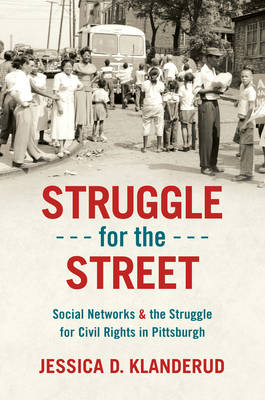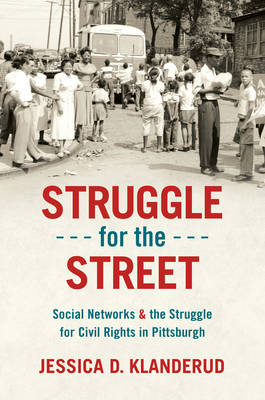
- Afhalen na 1 uur in een winkel met voorraad
- Gratis thuislevering in België vanaf € 30
- Ruim aanbod met 7 miljoen producten
- Afhalen na 1 uur in een winkel met voorraad
- Gratis thuislevering in België vanaf € 30
- Ruim aanbod met 7 miljoen producten
Zoeken
Struggle for the Street
Social Networks and the Struggle for Civil Rights in Pittsburgh
Jessica D Klanderud
€ 45,95
+ 91 punten
Uitvoering
Omschrijving
Cities are nothing without the streets--the arteries through which goods, people, and ideas flow. Neighborhood by neighborhood, block by block, the city streets are where politics begins. In Struggle for the Street, Jessica D. Klanderud documents the development of class-based visions of political, social, and economic equality in Pittsburgh's African American community between World War I and the early 1970s. Klanderud emphasizes how middle-class and working-class African Americans struggled over the appropriate uses and dominant meanings of street spaces in their neighborhoods as they collectively struggled to define equality.
In chapters that move from one community to the next, Klanderud tracks the transformation of tactics over time with a streets-eye view that reveals the coalescing alliances between neighbors and through space. Drawing on oral histories of neighborhood residents, Black newspapers, and papers from the NAACP and Urban League, this study reveals complex class negotiations in the struggle for civil rights at the street level.
In chapters that move from one community to the next, Klanderud tracks the transformation of tactics over time with a streets-eye view that reveals the coalescing alliances between neighbors and through space. Drawing on oral histories of neighborhood residents, Black newspapers, and papers from the NAACP and Urban League, this study reveals complex class negotiations in the struggle for civil rights at the street level.
Specificaties
Betrokkenen
- Auteur(s):
- Uitgeverij:
Inhoud
- Aantal bladzijden:
- 232
- Taal:
- Engels
- Reeks:
Eigenschappen
- Productcode (EAN):
- 9781469673721
- Verschijningsdatum:
- 11/04/2023
- Uitvoering:
- Paperback
- Formaat:
- Trade paperback (VS)
- Afmetingen:
- 156 mm x 234 mm
- Gewicht:
- 362 g

Alleen bij Standaard Boekhandel
+ 91 punten op je klantenkaart van Standaard Boekhandel
Beoordelingen
We publiceren alleen reviews die voldoen aan de voorwaarden voor reviews. Bekijk onze voorwaarden voor reviews.











